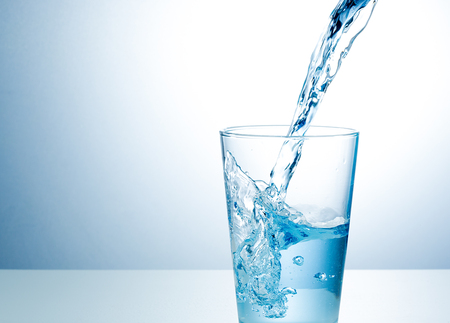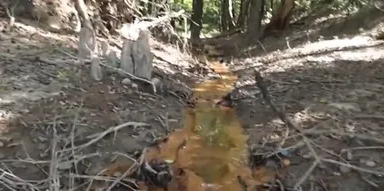
Water is H2O; but what is H2O? It’s a covalently bonded molecule made up of 2 Hydrogen atoms & 1 Oxygen atom. The Oxygen is highly electro-negative and the Hydrogen are more electro-positive, which gives the overall molecule a positive side and a negative side. In Chemistry we call this “polar”. The “polar” properties of the water molecule make for it to be a good solvent. As a matter of fact, God made water to be ‘the Universal Solvent’; that is, to a degree water dissolves almost everything it comes into contact with.
In the case of your well water, or your city-water aka ‘municipal well’, water contains typically dissolved inorganic Calcium (called Calcium Carbonate CaCO3)-Calcium Carbonate is not the kind of Calcium you body can make the best use of.
What you typically see in well water (be it private well or municipal well) is dissolved in organic minerals like Calcium Carbonate, iron in the form of ferrous hydroxide- clear water iron, something the body can easily absorb. Spinach is also a great source of absorbable iron.
Now when water falls to the earth in the form of precipitated distillate aka “rain” is is fundamentally distilled water. It is usually very highly purified by the natural process called ‘distillation’. Distillation is when water evaporates and rises into the atmosphere through convection & then cools as it comes into contact with cooler air in the upper atmosphere (it’s colder the higher up you go into the atmosphere), the vapor condenses. This usually happens around a tiny particle of dust. It starts to get heavier than the vapor and begins to fall towards earth, collecting up more and more tiny vapor particles as it falls and eventually forming a rain drop.
This tiny rain drop makes its long journey to earth and lands upon a leaf of a tree or a blade of grass , etc. What does it do?
The rain drop is most often absorbed into the stamen of the leaf where it’s nourishing hydration goes into the plant and beautifies the face of the earth by giving us nice rich oxygen. The rest of the rain drop lands upon the ground and gets absorbed by the plant’s root system to become nutrients for the plants. That is left over percolates through the ground, after running upon the surface of the ground in some way. When the rain percolates into the ground, it gets absorbed into the underground aquifer. This is a word for water that is under the ground sitting in the area. USGS has a lot to teach us about underground water, if you want to look at some of their literature you’ll find it quite interesting. )
When this rain drop lands upon the face of the earth, it lands as a solvent; that is, a highly aggressive solvent. Why is it an aggressive solvent?
BECAUSE THERE IS NO LOAD ON THE MOLECULE; THAT MEANS, THE WATER IS LOOKING TO DISSOLVE SOMETHING. In science circles, this is called “hungry water”. There is a reason why scientists & pharmacists use highly purified water when doing formulations of drugs and scientific experiments. The rain drop has no dissolved solids in it. This is why we can safely say that rain water is scientifically ‘hungry water’; that is, it’s looking to dissolve something. That is why rain water is so good at cleaning. Now the settlers and the earlier generations of Americans knew that rain water was better at cleaning and bathing. They use to keep a barrel of water by the downspout of the roof and use that ‘rain soft’ water for bathing & washing hair. My grandmother was WW1 generation lady. When she grew up they always kept a barrel by the downspout and used that ‘rain soft’ water to wash their hair.
Back then they didn’t understand Chemistry like we do today but, they did realize that their hair came out nice, clean, soft and they didn’t have the dry sticky feeling all over the body after you took a hard-water bath with zero lather. They didn’t understand what caused ‘the grey water’ as they looked down into the tub after a weekly bath on Sunday.
The Best Water Softeners

Who makes the best water softener? That is a legitimate question of which there is no single answer. I have 35 years experience in the water treatment industry and have worked for 3 Culligan dealership ( also Culligan Elmira ), a Kinetico dealership & 1 Rainsoft dealership. I’ve worked with all brands of water softeners. To answer the question: Who makes the best water softener, we would say
1.IT DEPENDS ON THE APPLICATION. Not 1 company is the answer. Softeners, that is, real softeners, all use salt. (If they say their “softener” doesn’t use salt, then in our opinion, you are not dealing with an honest company.)Your water needs are particular to your family’s use of the water as well as particular to the water chemistry. If you’re on a private well, your chemistry should be a big determining factor.
A water softener that is best for high iron bearing water is designed in a certain way. It’s not necessarily the most efficient design but high iron (Fe) bearing water requires certain design criteria.
A water softener that is of the Kinetico design is not the best design, in our opinion, for high Fe (iron) water. The Kinetico is a good design for city water but is it worth the super high cost?
As an Independent Water Treatment company, Southern Tier Water can recommend a multiplicity of options to the end user. We are in the service business. The equipment we sell are only tools to provide quality water. We sell what we see as the best choice for you.
Be advised, that if you buy a Culligan, you’re buying a proprietary product; that is, you can only get parts from them. And if you’re a looking at a softener that needs to be fixed, you can’t really shop around for service. Would you buy a car from a company where your independent repair shop can’t get parts without going to the dealership? In our opinion, that type of proprietary arangment, like Culligan has, is in their best interest but not the customer’s.
Iron Bacteria

Iron Bacteria is a micro-organism that metabolizes Fe. (Fe is the name of the element for iron.) Iron-bacteria is co-concurrent with hard water locations like Ithaca, Watkins Glen & Corning. To learn the water basics is more than just installing a water softener.
Southern Tier Water has had 6 semesters of Chemistry.
In our professional opinion, a wise homeowner should make sure the person they’re buying water treatment equipment from knows what he’s doing. And how can they know what they’re doing if they’ve never had a single semester of Chemistry and don’t even know what an electron is?
Anybody can sell water treatment equipment but not everyone selling water products knows what they’re doing. Often they just listen to vendors who sit behind a counter somewhere and read off of a brochure.
